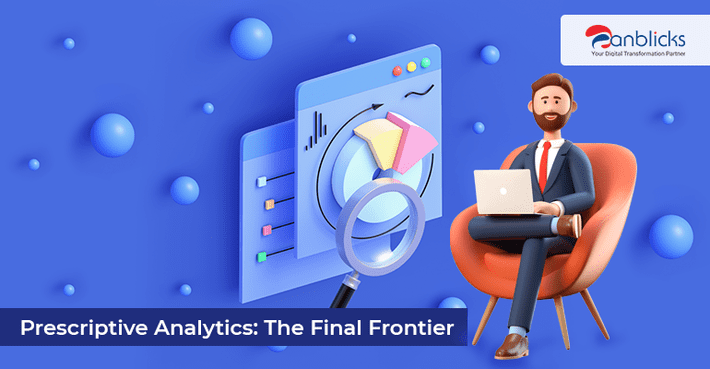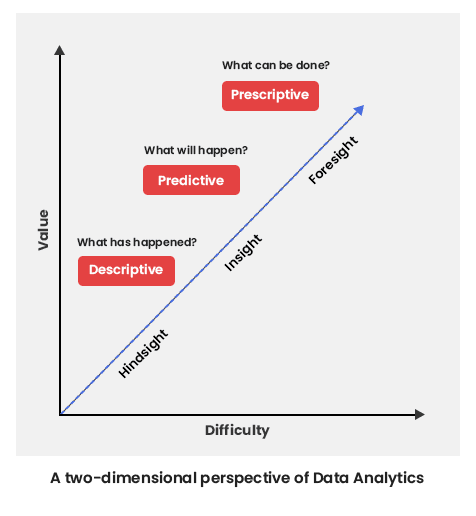
Back in 2014, Gartner placed the field of prescriptive analytics at the beginning of the ‘Peak of Inflated Expectations’ in their Hype Cycle of Emerging Technologies. And also went on to project the prescriptive analytics software market to reach $1.88 billion by 2022, with a 20.6% CAGR from 2017.
With a potential that big, it begs the question – what is prescriptive analytics, and why it has such a huge impact in the industry?
We know, Businesses are now moving towards data-driven decisions. Every decision that can impact business is backed up with hard data rather than making decisions that are intuitive or based on observation alone. But it is still humans who are devising strategies and thinking about a reaction to a situation or a problem.
Now imagine a situation where you know what will happen next and you must make a decision on how to diffuse this situation. And a possible solution or decision options are suggested by a machine or software. This would save hours strategizing!
This is the entry area of prescriptive analytics. It doesn’t stop at showing a likely outcome but continues to demonstrate suggested actions to make the end-users more successful, profitable or responsive to situational needs. It is a form of advanced analytics which examines data or content to answer the question “What should be done?” or “What can we do to make it happen?”
With this basic idea of prescriptive analytics, let’s see how this innovation could be the next big thing for any industry.
The field of data analytics can be categorized into three different forms of execution.
- Descriptive: Descriptive analytics provides insights into the past by answering “what happened.”
- Predictive: Predictive analytics takes it a step further by forecasting “what is likely to happen”
- Prescriptive: Prescriptive analytics prescribes an actual solution, as in “what we should do about it.” It recommends the best course of action. It will not be an overstatement to say

Prescriptive Analytics Use Cases
1. Travel Industry – Pricing Optimization
Online travel websites, such as airline ticketing services, hotel websites or car rental websites, have turned to prescriptive analytics to shift through multiple complex iterations of travel factors, purchase and customer variables such as demographics and sociographic, demand levels, and other related data sources to optimize their pricing and sales. Hence recommending what price to be set to gain the most out of the transaction.
2. Health Care Sector – Improving Care, Reducing Costs
In a pursuit to enable Critical healthcare decisions to be evidence-based, transparent and real-time data-driven, the industry is investing in decision optimization solutions to meet the challenges of an aging population, constraint budgets, and regulations. Consider an example of a healthcare insurance company that spots a pattern in its claims data for the previous year showing a significant portion of its diabetic patient, where the population also suffers from retinopathy. Using predictive analytics, the insurer estimates the probability of an increase in ophthalmology claims during the next plan year. Prescriptive analytics are then used to model out the cost impact if average ophthalmology reimbursement rates increase, decrease or remain the same for the next plan year, then recommend a course of action.
Decision optimization solutions like these complement descriptive and predictive analytics to deliver desired business results by applying prescriptive techniques to evaluate millions of possibilities, balancing tradeoffs and business constraints to find the best possible solution.
3. Sales and Marketing – Optimizing Campaign Spends
With enormous customer information coming in through ever-increasing digital touchpoints, sales and marketing are no longer limited to predictive analytics. The industry is now crossing a barrier by building Prescriptive models that help determine which campaigns to run to maximize the Return of Investments and optimize their target promotions down to a specific product category.
Beyond all these applications, the simplest (to comprehend) and the most amazing use case of our time is Google’s driverless cars. They must make multiple decisions about their next step based on predictions of future outcomes. Example: When turning, the car must anticipate everything that a normal driver must anticipate – pedestrians, traffic, and take the action based on the impact that decision will have.
Prescriptive analytics, with all its power, is the future of decision-making. Despite this, just 10% of organizations currently use some form of prescriptive analytics, this also according to Gartner, will grow to 35% by 2020.
There are several factors for this slow adoption:
- The unfamiliarity of the concept
- Complex understanding (even more than predictive analytics)
- Confusion on what value does it bring to the table
- Need of enormous data sets.
With all said and done, Prescriptive analytics is still a long way away before it will be a common language. With its potential to comprehend millions of data points and its intricate mathematical complexity to offer a data-driven decision choice, it is the next (or the final) frontier in the field of analytics. A step in the future!
To look at the larger scenario on how prescriptive analytics can assist your organization forecast future outcomes based on factual data and analytics techniques such as machine learning, connect with us on [email protected]
